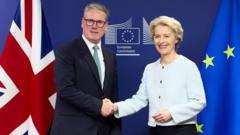
UK Government Seeks New EU Negotiator to Reset Relations
The UK government is recruiting a high-profile negotiator to lead efforts in resetting relations with the European Union, signaling a new approach to post-Brexit engagement. The newly created role of Second Permanent Secretary for European Union and International Economic Affairs comes as Prime Minister Sir Keir Starmer seeks to improve diplomatic and economic ties with Europe.
The job posting describes the position as a senior role that will receive significant public and political attention. The selected candidate will serve as a “sherpa” – a personal representative of the prime minister at international summits and engagements. With a salary range of £153,000 to £200,000, the negotiator will be responsible for overseeing critical policy areas including trade, border policy, and international relations.
Key responsibilities will include managing policy development across several important frameworks, such as:
– The Windsor Framework
– Trade and Cooperation Agreement
– Entry and Exit Scheme (a new digital EU border system)
A Cabinet Office spokesperson emphasized the role’s importance, stating that the position will help “reset our relationship with the EU” by building closer trade and security links and encouraging international investment.
Starmer has been clear about his intentions to improve UK-EU relations without reversing Brexit. In October, he made his first visit to Brussels since becoming prime minister, where he was warmly received by EU Commission President Ursula von der Leyen. During this visit, he advocated for closer cooperation on multiple fronts, including:
– Defense and security
– Climate change
– Irregular migration
– Economic growth
The prime minister has consistently maintained that while he seeks a reset, he does not intend to undo the Brexit process. Instead, his approach focuses on finding pragmatic ways to work more effectively with European partners.
The new negotiator will report directly to the minister for European Union relations and will lead official-level discussions aimed at driving economic growth and improving bilateral relations.
This strategic appointment reflects the government’s commitment to developing a more constructive relationship with the EU, acknowledging the complex diplomatic landscape following the UK’s departure from the European Union. By creating this dedicated role, the government signals its intention to pursue a nuanced approach to international relations that balances national interests with the need for collaborative engagement.
The job represents a significant opportunity for a senior diplomatic professional to play a crucial role in shaping the UK’s post-Brexit European strategy, working to maximize potential economic and strategic benefits while maintaining the fundamental principles of the UK’s independent position.








